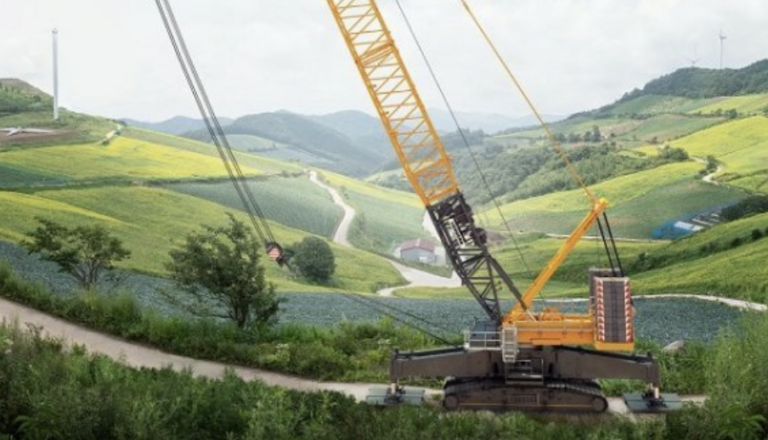Liebherr has unveiled the successor to its successful 600-tonne LR 1600/2-W narrow track crawler crane. With more power and greater lifting height, the LR 1700-1.0W offers the best prerequisites for efficient assembly of modern wind turbines in wind farms.
To meet the challenging demands for driving and steering, Liebherr has equipped the crane’s new narrow track travel gear with components from its next larger crane class. The new 700-tonner is now the benchmark for narrow track cranes worldwide.
Narrow track crawler cranes are optimised for use on wind farms: they can travel from one turbine to the next along the existing routes and be deployed very quickly. Liebherr developed the first narrow track lattice boom crawler crane 20 years ago, the LR 1400/2-W. However, in the intervening years wind turbine towers have become taller and wind power components heavier. For this reason, Liebherr launched the significantly more powerful LR 1600/2-W back in 2010, of which around 50 units are currently in operation worldwide. However, assembly of the latest generation of wind turbines now requires cranes with an even higher lifting capacity.
Just as the LR 1700-1.0 replaced the LR 1600/2 in Liebherr’s line-up almost two years ago, the narrow track version of the 600-tonner is now also being replaced by the new 700-tonne LR 1700-1.0W. The company’s successful crane concept has thus been continued: Liebherr has designed a narrow crawler travel gear and a new centre section with star support for the existing slewing platform. The boom systems from the standard crane can be adopted to a large extent. At 5.9 metres, the crawler travel gear is only 10 cm wider than its predecessor. When driving, the supports are folded forwards and backwards.
The biggest differences to the predecessor model, the LR 1600/2-W, are the new crane’s significantly higher lifting capacities and greater lifting heights. The basis for this is a more powerful basic machine as well as the 3.5-metre-wide H-lattice type sections in the lower area of the main boom, which increase the lateral stability of the entire system. Comparing the longest wind-turbine boom with the derrick system on the predecessor model (156-metre main boom plus 12-metre lattice type fixed jib) with the new crane with the same boom length results in a 64 per cent increase in lifting capacity (from 73 to 120 tonnes).
In addition, the new LR 1700-1.0W can be built up higher: with derrick system plus 15 meters, without derrick system plus 6 meters. The new crane thus meets the more challenging requirements of working on modern wind turbines with hub heights reaching 170 metres. Liebherr also offers the LR 1700-1.0W with a luffing jib. This option was not available for its predecessor.
The V-frame and VarioTray have more than proven their worth on the LR 1700-1.0, LR 1800-1.0 and LR 11000 crawler cranes. Therefore, the narrow-gauge variant of the LR 1700-1.0 also receives these innovative systems. The “VarioTray” is a small counterweight frame that can be unbolted quickly and easily as required. This eliminates the need for tiresome stacking and unstacking of counterweight plates. The V-Frame ballasting system is a hydraulically adjustable folding frame that allows the ballast radius of the 700-tonne crawler crane to be adjusted continuously between 13 and 21 metres. A rigid ballasting system is thus no longer required for large radii. These innovations offer great advantages, especially for wind turbine assembly.





